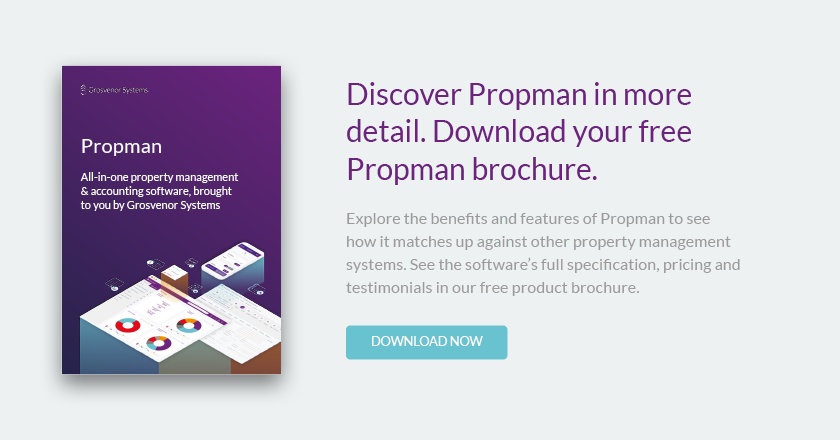Overcoming the Challenge of Scalability in Block Management
The block management market is seeing dynamic growth. As the demand for new homes grows there is increasing pressure to build more flats, which in turn is creating opportunities for property managers and it is easy to see the potential for growth.
This is great news for property managers, but residential management is not a simple task. Block management companies have a complex mix of accounting and property–related challenges to deal with. They need to regularly send out service charge demands and record the progress of maintenance work while keeping budgets under control. They need to have all relevant information available to them in one easily accessible place and, at the same time, they have to deal with complex differences between individual leases, payment plans and schedules.
These challenges are further intensified by business growth. Ambitious companies are continually looking to expand to drive profits and compete against the heavyweight players. Unfortunately, growth can lead to escalating outgoings, with significantly more service charges to collect, more maintenance works to manage and more suppliers to pay. It may also increase one of the other biggest drivers of expenditure for block managers – postage.
Throughout the year, a block management company will have to send out multiple documents to each flat owner. Estimates suggest that annually there could be on average ten documents issued as standard. This typically includes end-of-year statements and details of planned maintenance work as well as more general ad-hoc letters.
On average, block managers may end up paying £6 per flat owner in postage costs annually. While this figure on its own may not sound a lot, when you consider it multiplied by the number of units and the cost of the time spent administering the whole process, it soon adds up to a much more significant business expense.
Taking into account the more ambitious block management companies looking to grow, this sum also grows. And it’s worth remembering that generally, agents don’t charge separately for this postage. Instead, it just comes straight out of their management fee.
Block managers are not always helped in managing the impact of these challenges by the systems and solutions they use. They are often left and try and meet them through a combination of legacy spreadsheets and entry-level accounting packages. The problem is that these solutions are not specifically designed to address the specific job in hand. Accounting software often has no way of setting up service charge schedules or lease service charge agreements. As a result, block managers often have to do all the work themselves manually in spreadsheets – a laborious, time-consuming process.
Finding an answer to the complexities of block management
To cope with the workload, firms may look to bring on more staff, pushing running costs up further. It seems an intractable problem. Fortunately, block managers can now achieve sustained growth and keep costs under control by basing their approach on automated technology that integrates financial and property management, conserving resources and driving enhanced profitability.
The best of these systems are intuitive and easy-to-use. They can handle the day-to-day management of properties and also deal with the accounts. This means managing service charge accounting, including budgeting, reporting and reconciliation pre-payments and accruals, but also sending out demands to lessees.
Critically, where blocks have complex schedules in place, the latest IT solutions can automatically work out the exact share of the overall block expenditure for which each individual lessee is liable, as well as quickly calculating any over or underspend compared to budget at the end of each year.
This is a much quicker and more efficient approach than managing the process with spreadsheets. This kind of integrated property management and financial accounting software also brings benefits when it comes to keeping postage costs under control. By automatically emailing reminders, demands, arrears letters and statements rather than sending out physical documentation, property managers can save time and money as postage and stationery costs, the cost of paper, envelopes and stamps, are all reduced.
Reaping the rewards of streamlined block management
Of course, there does have to be a cost/value calculation made when it comes to making an investment in IT solutions. For the smallest businesses and start-up block management companies, spreadsheets are initially likely to be the tool of choice but as they grow, the latest integrated property management software and financial accounting software becomes a more viable and attractive option.
When they achieve a roster of between 500 – 1,000 flats, firms will typically have sufficient management fee income to make these solutions a hugely beneficial choice. But for fast-growing businesses with a strong business plan in place, good relationships and confidence in their future growth potential, it will make sense to start thinking about specialist software solutions from the word go.
Ultimately, though, the predominant benefit these systems bring to property managers is that by reducing the time it takes to carry out their regular duties as well as the costs incurred, they are able to manage more blocks and bring in greater revenues with the same staffing levels as before – and that’s an issue that becomes more acute as businesses develop and expand.
It seems likely that the growing demand for property management software solutions will continue to increase over time. As technology continues to develop at a rapid pace, software solutions will only get quicker, smarter and more comprehensive. This level of innovation coupled with an expanding block management market creates a huge opportunity for businesses willing to embrace technology.


